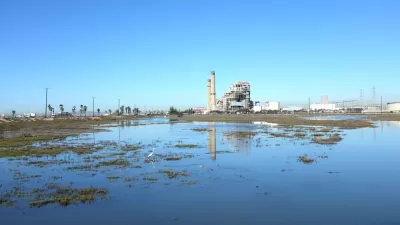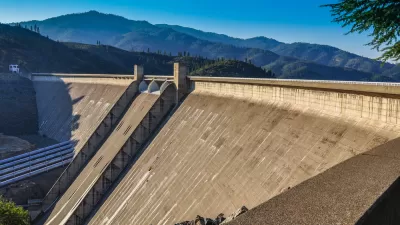We can all do better when it comes to water.

Humankind has something of a reverse Midas touch when it comes to our treatment of the world and its resources. Nowhere is this more evident than in the current state of the water table.
You might be surprised to learn parts of the country and the world are in dire straits when it comes to reliably accessing potable water. The worst part is that we're all to blame. Thanks to inefficient and unnecessary irrigation, our routine mistreatment of water basins, and a host of other poor choices, we're all guilty where water is concerned.
Let's talk about some of these problems, what they mean, and how we can do better.
Unnecessary and Wasteful Irrigation Systems
You may be no stranger to pop-up sprinklers and other irrigation systems if you live in a development or under the purview of a homeowners' association. The truth is, these kinds of housing developments can be incredibly wasteful of water.
Consider a single example from the Lakewood Ranch community in Manatee County, Florida. When management looked into their irrigation practices and water usage for the month of June 2017, compared with rainfall for that same period, they discovered something dismaying. June saw rainfall of between 10 inches and one foot—yet the development still used 47 million gallons of water and ran up a hefty tab with the utility company.
The story reveals the broken approach of water management in this country—one where we rely on chance and the honor system to govern the use of a resource that’s imperfectly distributed in this and most other countries.
To be sure, organizing an irrigation system shutoff during months where it's not needed would require timelier and more frequent communication between HOA management and the unit occupants, but that’s not an excuse to not try. If there's a cause worth talking about more frequently, it's water.
Water Basins Being Depleted
While the political world ties itself up in knots debating physical reality, the scientific community continues to deliver hard truths about our effect on the planet's climate.
According to a study published by agricultural authorities, economists, and climatologists from MIT, climate change will dramatically reduce our ability to produce food crops. By 2050, they say the effects will be unmistakable in the United States' already drought-prone areas like the midwestern and southwestern states.
What's at stake? Our sources of cotton, grasses, hays, livestock feed, and more. These are all thirsty crops that require irrigation equipment and infrastructure to help farmers move water from one location to someplace else where it's needed. The problem is, climate change is seeing many of these water basins dry up.
The effects are already evident. The study predicts that maize crops in Utah alone could see their yields drop from an already perilous 40% to a tragic 10%.
You probably need no reminder that hunger still exists in the world in 2017. Ignoring climate change's negative impact on irrigation practices will dramatically threaten our very ability to feed ourselves, and it could happen sooner than you may think.
Untreated Wastewater Used in Irrigation
As you've likely guessed, plant-based organisms are somewhat less choosy about the quality of water than humans tend to be. This is a beneficial state of affairs since it means we can use less-than-perfect water to slake our crops without going to the added trouble and expense of treating it the way we’d treat water intended for human consumption.
Unfortunately, we've abused this privilege. Studies in Germany have found using untreated wastewater on crops puts an unthinkable number of lives at risk. If we deliver untreated water to farmland, wastewater could carry a wide variety of bacteria or even larger parasites.
In poorer parts of the country and the world, these conveniently microscopic problems could mean a death sentence. American citizens don't often consider diarrhea to be a terminal prognosis, but that’s the reality in poorer countries where diets and lifestyles are already less than ideal.
The far safer and healthier approach is to use treated "greywater" to water crops instead. Whereas untreated wastewater poses a health risk and untreated greywater contributes to runoff and erosion since it can't penetrate soil as well, treated greywater handles both challenges admirably.
Greywater refers to any wastewater produced in a residential or commercial building—except for water that comes from the toilet. If it's left untreated but used to irrigate farmland, this water may result in "greywater-induced hydrophobicity," which means the water can't infiltrate the soil as well as cleaner water, leaving crops thirsty and with compromised root systems.
To help build cleaner, safer, and more efficient irrigation systems, it's possible for agricultural operations to engage in the onsite repurposing of their greywater.
In areas of the country with many farming operations going simultaneously, the water table is heavily burdened, leading to an overabundance of nitrates in drinking water supplies. Investments in proper treatment equipment have successfully lowered these nitrate levels by 50%.
Both well-established and developing nations have identified local, onsite treatment of some kinds of wastewater as a low-risk way to use some of the water we can't drink ourselves. In turn, we lessen the collective burden we place on our planet's resources.
A Time for Compromise
The underlying theme here is that we need to take a long, hard look at how we've traditionally chosen to irrigate our farmland. If we don't, a chorus of voices from the scientific community predict sweeping water and food shortages by the end of the 21st century.
While it's true that our drinking water seems more threatened today than ever, from more directions than ever, compromise and innovation are already helping to deliver us from our recklessness.
Even in the shadow of significant challenges, new technologies and fresh efforts to conserve are bringing a higher and more uniform standard of living across the globe.

Maui's Vacation Rental Debate Turns Ugly
Verbal attacks, misinformation campaigns and fistfights plague a high-stakes debate to convert thousands of vacation rentals into long-term housing.

Planetizen Federal Action Tracker
A weekly monitor of how Trump’s orders and actions are impacting planners and planning in America.

San Francisco Suspends Traffic Calming Amidst Record Deaths
Citing “a challenging fiscal landscape,” the city will cease the program on the heels of 42 traffic deaths, including 24 pedestrians.

Defunct Pittsburgh Power Plant to Become Residential Tower
A decommissioned steam heat plant will be redeveloped into almost 100 affordable housing units.

Trump Prompts Restructuring of Transportation Research Board in “Unprecedented Overreach”
The TRB has eliminated more than half of its committees including those focused on climate, equity, and cities.

Amtrak Rolls Out New Orleans to Alabama “Mardi Gras” Train
The new service will operate morning and evening departures between Mobile and New Orleans.
Urban Design for Planners 1: Software Tools
This six-course series explores essential urban design concepts using open source software and equips planners with the tools they need to participate fully in the urban design process.
Planning for Universal Design
Learn the tools for implementing Universal Design in planning regulations.
Heyer Gruel & Associates PA
JM Goldson LLC
Custer County Colorado
City of Camden Redevelopment Agency
City of Astoria
Transportation Research & Education Center (TREC) at Portland State University
Jefferson Parish Government
Camden Redevelopment Agency
City of Claremont






























